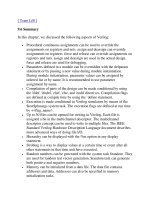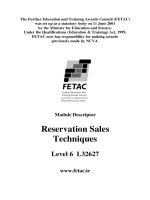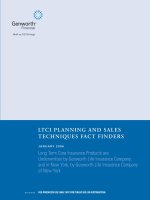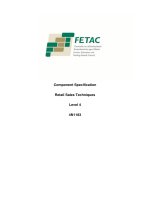Component Specification Retail Sales Techniques Level 4 - 4N1183 pot
Bạn đang xem bản rút gọn của tài liệu. Xem và tải ngay bản đầy đủ của tài liệu tại đây (29.69 KB, 6 trang )
Component Specification
Retail Sales Techniques
Level 4
4N1183
2
1. Introduction
The Further Education and Training Awards Council is the single national awarding body in
further education and training in Ireland. It is responsible for determining the standards for named
awards at levels 1 to 6 on the National Framework of Qualifications. All named awards are
devised in line with the National Qualifications Authority of Ireland's determinations and
guidelines.
2. The National Framework of Qualifications
The National Framework of Qualifications comprises 10 levels ranging from initial learning (level
1) to the most advanced levels of learning (level 10).
At each level there are one or more award types. An award type is a grouping of awards that
share similar features. The National Qualifications Authority of Ireland has determined Award
Type Descriptors for each award type. Seewww.nqai.ie.The Award Type Descriptor identifies the
key strands and sub-strands of knowledge, skill and competence for that award type.
3. Guide to Level
Independence is the hallmark of this level. Learning outcomes at this level correspond to a
growing sense of responsibility for participating in public life and shaping ones own life. The
outcomes at this level would be associated with first-time entry to many occupational sectors.
Extract from 'Determinations for the Outline National Framework of Qualifications': NQAI (www.nqai.ie)
Strand Sub-strand Nature of learning
Knowledge Breadth Broad range of knowledge
Kind Some theoretical concepts and abstract thinking, with significant
depth in some areas
Know How &
Skill
Range Demonstrate a moderate range of practical and cognitive skills and
tools
Selectivity Select from a range of procedures and apply known solutions to a
variety of predictable problems
Competence Context Act in familiar and unfamiliar contexts
Role Act with considerable amount of responsibility and autonomy
Learning to
Learn
Learn to take responsibility for own learning within a supervised
environment
Insight Assume partial responsibility for consistency of self-understanding
and behaviour
3
4. Award Specifications
FETAC determines the standards for all awards in partnership with relevant stakeholders. This
awardwas developed in line with the Council policy on Standards Development published in
September 2005.
Standards are published in the form of Award Specifications. A Specification is devised in respect
of each named award. Each Specification provides a comprehensive description of the features,
characteristics and standards of the award.
ACertificate Specificationis published for each namedmajor award.
AComponent Specificationis published for each namedminor award.Please note that each
component (i.e. minor award) is associated with one or more Certificates (i.e. major, special
purpose or supplemental award). Seewww.fetac.ie.
ASpecific Purpose Specificationis published for eachspecial purpose award.
ASupplemental Specificationis published for eachsupplemental award.
Standards are expressed in terms oflearning outcomesi.e. concise statements of what the
learner is expected to know or be able to do in order to achieve that award.
Learning outcomes for all awards (i.e. major, special purpose, supplemental awards) are
contained within the associated Component Specifications.
4
5. Component Details
Title Retail Sales Techniques
Teideal as Gaeilge Teicnící Díolacháin Mhiondíola
Award Type Minor
Code 4N1183
Level 4
Credit Value 10
Purpose The purpose of this award is to equip the learner with the knowledge,
skill and competence to operate effectively in a retail selling
environments.
Learning Outcomes Learners will be able to:
1 Explain the key principles of the retail environment in relation to
customer care and retail selling
2 Explain key terminology and practices utilised in retail selling to
include related sales, up selling, after sales service, customer
services and unique selling points
3 Outline the legal responsibilities and entitlements of staff and
customers in relation to a retail environment
4 Differentiate between a range of products and services provided
by the retail sector
5 Describe the key benefits of an effective after sales services
policy in relation to the creation of new business
6 Describe a range of specific product characteristics to include
features, benefits and advantages
7 Explain a range of learning methods aimed at improving
knowledge in relation to products and retail services
8 Outline the benefits of establishing a customer profile
9 Outline a range of procedures aimed at improving health and
safety in the retail environment
10 Employ a range of communication techniques aimed at
assessing customer needs to include open and closed
questions, product descriptions
5
11 Demonstrate a range of communication skills to present
products and deal with customer complaints
12 Identify key opportunities to open and close a sale while
operating in a retail environment
13 Demonstrate an ability to match products and services to
customers needs
14 Employ customer relation skills to Identify the characteristics and
requirements of a range of customer profiles
15 Demonstrate the application of appropriate interpersonal skills
and attitudes when differentiating between a range of customer's
needs, in a retail setting.
Assessment
General Information Details of FETAC's assessment requirements are set out inAssessment
Guidelines for Providers.
All FETAC assessment is criterion referenced. Successful achievement
of the award is based on learners attaining the required standards of
knowledge, skill or competence.
The techniques set out below are considered the optimum approach to
assessment for this component. In exceptional circumstances providers
may identify alternative assessment techniques through the provider's
application for programme validation which arereliableandvalidbut
which are more appropriate to their context.
Assessment of a number of components may be integrated across
programmes for delivery, provided that the learning outcomes of each
minor award are assessed.
Group or team work may form part of the assessment, provided each
learner's achievement is separately assessed.
All providers are required to submit an assessment plan as part of their
application for programme validation. Assessment Plans will include
information relating to scheduling and integration of assessment.See
FETAC's Provider Guidelines for Programme Validation.
Assessment
Techniques
In order to demonstrate that they have reached the standards of
knowledge, skill and competence identified in all the learning outcomes,
learners are required to complete the assessment(s) below.
The assessor is responsible for devising assessment instruments (e.g.
project and assignment briefs, examination papers), assessment criteria
and mark sheets, consistent with the techniques identified below and
FETAC's assessment requirements.
Programme validation will require providers to map each learning
outcome to its associated assessment technique.See FETAC's Provider
Guidelines for Programme Validation.
All learning outcomesmustbe assessed.
6
Portfolio / Collection of Work 70%
Skills Demonstration 30%
Description
Portfolio / Collection of Work
A portfolio or collection of work is a collection and/or selection of pieces
of work produced by the learner over a period of time that demonstrates
achievement of a range of learning outcomes. The collection may be
self-generated or may be generated in response to a particular brief or
tasks/activities devised by the assessor.
Skills Demonstration
A skills demonstration is used to assess a wide range of practical based
learning outcomes including practical skills and knowledge. A skills
demonstration will require the learner to complete a task or series of
tasks that demonstrate a range of skills.
Recognition of Prior
Learning (RPL)
Learners may be assessed on the basis of their prior knowledge and
experience. Providers must be specifically quality assured to assess
learners by this means. To do so they must complete B10, see
Provider's Quality Assurance Guidelines and be included on the
Register of RPL approved providers. See RPL Guidelines at
www.fetac.iefor further information and registration details.
Grading Pass 50% - 64%
Merit 65% - 79%
Distinction 80% - 100%
Specific Validation
Requirements
There are no specific validation requirements for this award
Supporting
Documentation
None
Access To access programmes leading to this award the learner should have
reached the standards of knowledge, skill and competence associated
with the preceding level of the National Framework of Qualifications.
This may have been achieved through a formal qualification or through
relevant life and work experience.
Transfer Successful completion of this component award enables the learner to
transfer to programmes leading to other certificates where this
component is a mandatory or an elective requirement.









